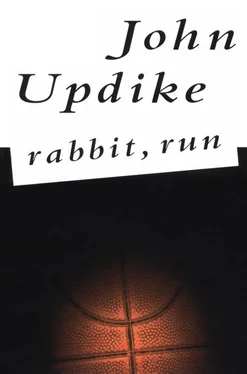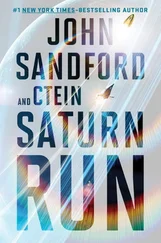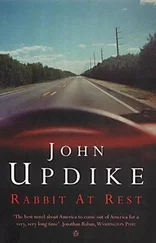Rabbit, Run
By John Updike
The motions of Grace, the hardness of the heart; external circumstances.
—Pascal, Pensée 507
Boys are playing basketball around a telephone pole with a backboard bolted to it. Legs, shouts. The scrape and snap of Keds on loose alley pebbles seems to catapult their voices high into the moist March air blue above the wires. Rabbit Angstrom, coming up the alley in a business suit, stops and watches, though he's twenty—six and six three. So tall, he seems an unlikely rabbit, but the breadth of white face, the pallor of his blue irises, and a nervous flutter under his brief nose as he stabs a cigarette into his mouth partially explain the nickname, which was given to him when he too was a boy. He stands there thinking, the kids keep coming, they keep crowding you up.
His standing there makes the real boys feel strange. Eyeballs slide. They're doing this for themselves, not as a show for some adult walking around town in a double—breasted cocoa suit. It seems funny to them, an adult walking up the alley at all. Where's his car? The cigarette makes it more sinister still. Is this one of those going to offer them cigarettes or money to go out in back of the ice plant with him? They've heard of such things but are not too frightened; there are six of them and one of him.
The ball, rocketing off the crotch of the rim, leaps over the heads of the six and lands at the feet of the one. He catches it on the short bounce with a quickness that startles them. As they stare hushed he sights squinting through blue clouds of weed smoke, a suddenly dark silhouette like a smokestack against the afternoon spring sky, setting his feet with care, wiggling the ball with nervousness in front of his chest, one widespread white hand on top of the ball and the other underneath, jiggling it patiently to get some adjustment in air itself. The cuticle moons on his fingernails are big. Then the ball seems to ride up the right lapel of his coat and comes off his shoulder as his knees dip down, and it appears the ball will miss because though he shot from an angle the ball is not going toward the backboard. It was not aimed there. It drops into the circle of the rim, whipping the net with a ladylike whisper. "Hey!" he shouts in pride.
"Luck," one of the kids says.
"Skill," he answers, and asks, "Hey. O.K. if I play?"
There is no response, just puzzled silly looks swapped. Rabbit takes off his coat, folds it nicely, and rests it on a clean ashcan lid. Behind him the dungarees begin to scuffle again. He goes into the scrimmaging thick of them for the ball, flips it from two weak grubby—knuckled child's hands, has it in his own. That old stretched—leather feeling makes his whole body go taut, gives his arms wings. It feels like he's reaching down through years to touch this tautness. His arms lift of their own and the rubber ball floats toward the basket from the top of his head. It feels so right he blinks when the ball drops short, and for a second wonders if it went through the hoop without rifling the net. He asks, "Hey whose side am Ion?"
In a wordless shuffle two boys are delegated to be his. They stand the other four. Though from the start Rabbit handicaps himself by staying ten feet out from the basket, it is still unfair. Nobody bothers to keep score. The surly silence bothers him. The kids call monosyllables to each other but to him they don't dare a word. As the game goes on he can feel them at his legs, getting hot and mad, trying to trip him, but their tongues are still held. He doesn't want this respect, he wants to tell them there's nothing to getting old, it takes nothing. In ten minutes another boy goes to the other side, so it's just Rabbit Angstrom and one kid standing five. This boy, still midget but already diffident with a kind of rangy ease, is the best of the six; he wears a knitted cap with a green pompon well down over his ears and level with his eyebrows, giving his head a cretinous look. He's a natural. The way he moves sideways without taking any steps, gliding on a blessing: you can tell. The way he waits before he moves. With luck he'll become in time a crack athlete in the high school; Rabbit knows the way. You climb up through the little grades and then get to the top and everybody cheers; with the sweat in your eyebrows you can't see very well and the noise swirls around you and lifts you up, and then you're out, not forgotten at first, just out, and it feels good and cool and free. You're out, and sort of melt, and keep lifting, until you become like to these kids just one more piece of the sky of adults that hangs over them in the town, a piece that for some queer reason has clouded and visited them. They've not forgotten him: worse, they never heard of him. Yet in his time Rabbit was famous through the county; in basketball in his junior year he set a B—league scoring record that in his senior year he broke with a record that was not broken until four years later, that is, four years ago.
He sinks shots one—handed, two—handed, underhanded, flatfooted, and out of the pivot, jump, and set. Flat and soft the ball lifts. That his touch still lives in his hands elates him. He feels liberated from long gloom. But his body is weighty and his breath grows short. It annoys him, that he gets winded. When the five kids not on his side begin to groan and act lazy, and a kid he accidentally knocks down gets up with a blurred face and walks away, Rabbit quits readily. "O.K.," he says. "The old man's going. Three cheers."
To the boy on his side, the pompon, he adds, "So long, ace." He feels grateful to the boy, who continued to watch him with disinterested admiration after the others grew sullen. Naturals know. It's all in how it feels.
Rabbit picks up his folded coat and carries it in one hand like a letter as he runs. Up the alley. Past the deserted ice plant with its rotting wooden skids on the fallen loading porch. Ashcans, garage doors, fences of chicken—wire caging crisscrossing stalks of dead flowers. The month is March. Love makes the air light. Things start anew; Rabbit tastes through sour aftersmoke the fresh chance in the air, plucks the pack of cigarettes from his bobbling shirt pocket, and without breaking stride cans it in somebody's open barrel. His upper lip nibbles back from his teeth in self—pleasure. His big suede shoes skim in thumps above the skittering litter of alley gravel.
Running. At the end of this block of the alley he turns up a sh=eet, Wilbur Street in the town of Mt. Judge, suburb of the city of Brewer, fifth largest city in Pennsylvania. Running uphill. Past a block of big homes, small fortresses of cement and brick inset with doorways of stained and beveled glass and windows of potted plants; and then half the way up another block, which holds a development built all at once in the Thirties. The frame homes climb the hill like a single staircase. The space of six feet or so that each double house rises above its neighbor contains two wan windows, wide—spaced like the eyes of an animal, and is covered with composition shingling varying in color from bruise to dung. The fronts are scabby clapboards, once white. There are a dozen three—story homes, and each has two doors. The seventh door is his. The wood steps up to it are worn; under them there is a cubbyhole of dirt where a lost toy molders. A plastic clown. He's seen it there all winter but he always thought some kid would be coming back for it.
Rabbit pauses in the sunless vestibule, panting. Overhead, a daytime bulb bums dustily. Three tin mailboxes hang empty
above a brown radiator. His downstairs neighbor's door across the hall is shut like a hurt face. There is that smell which is always the same but that he can never identify; sometimes it seems cabbage cooking, sometimes the furnace's rusty breath, sometimes something soft decaying in the walls. He climbs the stairs to his home, the top floor.
Читать дальше












